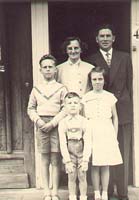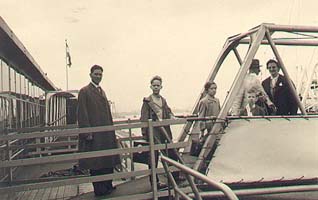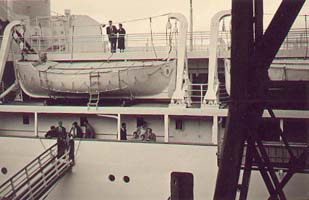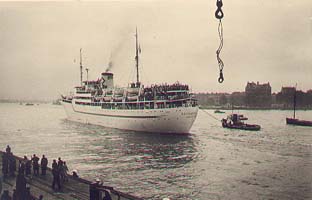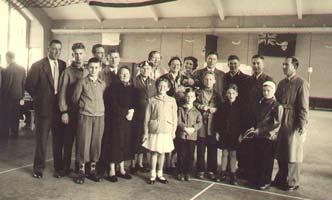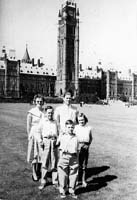Sobey Wall of Honour
Column
4
Row
24
Emigrating To Canada
September 1956
The photograph below was taken in front of our doorway at 473 Schimmelweg Straat, Rijswijk, Den Haag, Nederland on the morning of our departure. It was September 16, 1956. From tallest to shortest, we are Ben, Rina, Fred, Nettie (Jeannette) and Joop (John) Lindeijer.
I personally had no idea where we were going. I had said goodbye to friends and classmates and knew we'd be leaving for Canada for good. I knew nothing about Canada. My Dad was the only one who knew how to speak English. He could speak German and French too.
I know who most of them are but haven't seen them in many decades. Some of my Dad's brothers eventually came for a visit to Canada. My Mom's brother and his wife visited us twice. I think my Grandmother visited three or more times. Once, for a six month stretch, which disturbed my sister no end as the two of them did not get along. Two of my Dad's brothers already lived in Canada prior to our immigration. Rein Lindeijer lived in Dresden, Ontario with his wife Dien and their children, Nellie, Rein, Dini and Frits. Godfried Lindeijer was a bachelor in Rocky Mountain House, Alberta.
In Photo 2, the family must have responded to a shout from a family member as we all turned to face the camera one last time. I can't help but think now how scary this must have been for all of us. At the time, I had no fear nor trepidation. Dad was taking us to Canada and he must have had a very good reason. He never told me what that reason was. Much later, after he passed away, I asked Mom why we moved to Canada. She told me it was either Canada or France, and she really didn't understand Dad's desire to emigrate. At the time there was an active program by the Dutch Government to encourage emigration to Canada, Australia and the USA. Dad probably took advantage of this program since he felt stuck in the economic quagmire of post WWII life in Holland. Brother Joop speculates that Dad's profession (printer and compositor) was not that well respected and that Cor Bettinger, Dad's friend in Canada, convinced him that this was not the case in Canada.
From where we were standing we had no idea that family members were still taking pictures. It was like going to the airport to see off relatives in the days when you could stand on the outside observation platform. You could wave goodbye as they walked out on the tarmac and boarded the plane. You'd wave and wave. You'd wave at the window of the plane you thought was occupied by your relative as the plane took off at the far end of the runway. You'd wave and wave till the plane disappeared into the clouds just in case they might be looking down at you. This is what it felt like when we stood on the deck of the Skaubryn that day in September 1956. This is what it felt like even more when the ship left the docks and headed to sea.
The last bit of land we saw was the south coast of England on the distant northern horizon. It took nine days to cross the Atlantic Ocean, two more than usual. We were delayed by heavy weather a day or two.
I remember that our cabin was either on the same deck or a deck up from the galley area. The smells that emanated from that galley forced most people on the same deck to walk around with cologne soaked handkerchiefs stuck to their faces. It didn't seem to bother my sister and brother and me. We spent a lot of time making parachutes from string and tissues the oranges came wrapped up in. We'd drop the parachutes down the middle of the large stairwell used to access all decks. A rather large ship's employee did not appreciate our sense of adventure and fun. She chased after us on several occasions.
Souvenir sailor dolls/puppets were sold in the ship's store and I wanted one. When I asked for one, mom told me she had no money for souvenirs. I knew I couldn't argue with her so I threw a tantrum, ran back to the cabin and hid in the closet to show her a thing or two. When I slammed the closet door shut, the latch fell down on the outside, locking me in. Realizing that no one knew where I was and in the event of the ship sinking, no one would come to my rescue, I panicked. Visions of water rushing in through the porthole came to my mind so I kicked the plastic ventilation cover off the door and called for help as loudly as I could. People ran to get my parents who burst in and freed me from impending doom. I was in such a state that to calm me down, Mom bought each of us a souvenir ship's sailor doll.
During the two day storm, everyone we met was seasick, except for my sister and me. It became a little contest to see which one of us could last the longest. One day, for no reason at all, sis spied someone eating a hot dog and that was enough to set her off. She ran to the rail and tossed her cookies and everything else she had eaten that day.
I remember flying fish, dolphins, and icebergs. During the storm, I was fascinated by a freighter heading for Europe. The waves were so large that at one time the ship's bow was completely out of the water and the next, I could see the ship's propellers.
The first sight of land happened in the late afternoon on September 25. I later discovered it was Chebucto Head. It took a bit longer to fully enter Halifax Harbour and pull up beside McNab's Island for the night as we arrived too late to go through Immigration that day.
The next morning saw us in the immigration sheds at Pier 21. Shed is what it was. Green painted steel beams and columns supported a cavernous space divided into chain link enclosures containing wooden benches for people to sit on. I don't remember much more than that and might have some of the details wrong. Dad looked after what he had to look after. Later we were told to go across an elevated walkway to a smaller lower building to board the train. The train was stationed right outside the door. I mean not even a side walk. It was right there. The only thing I remember about the train ride was receiving a cinder in my eye when I lowered the window to peer out ahead at the oncoming scenery. The train was pulled by a coal burning locomotive, something I hadn't seen on a passenger train in Holland since they converted to electricity before I was born.
We arrived in Ottawa, Ontario in the late afternoon or early evening of September 27. Dad's long time friend Cor Bettinger, who had emigrated to Canada some years before picked us up. We lived with him and his family for about three months before we got a place of our own. When we left Holland, Dad had a job arranged in Canada. When we arrived in Ottawa, the job had fallen through. That was Friday September 28. It must have been a hectic weekend for Monday October 1 saw the three of us in school and my Dad with another job, which he kept till he retired.
I didn't remember this, but my sister told me that brother John and I hid under the principal's desk when mom brought us to school that first day. I do remember crying while mom towed me down the hall to the classroom. The school principal decided that in our best interest my sister, age 9 and I, age 10, should be put back a grade due to the fact that we didn't speak English. My brother was only six years old, young enough to learn English without being put back a year. Not only that, he was smart enough to do grades 3 and 4 in one year. I have never understood the principal's reasoning. His decision resulted in sis and I to be a year or two older than other students in class all the way through public and high school. His reasoning was moot, since my homeroom teacher took it upon herself to teach the three of us English in her spare time an hour or more each day after class. I can still remember her husband/boyfriend pacing the hall while we were learning where Dick was in relation to Jane and her dog Spot. In six months the three of us were speaking English well enough to go it alone. A year or so after that, no one could tell we were not born in Canada.
Post Script: The Skaubryn caught fire and foundered on March 31,1958 in the Indian Ocean on the way to Australia. 1082 passengers (900 of which were German Immigrants) and 208 crew were rescued. The only casualty was an elderly gentleman who suffered a heart attack sitting in his lifeboat. The Skaubryn sank the next day.
